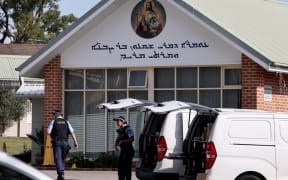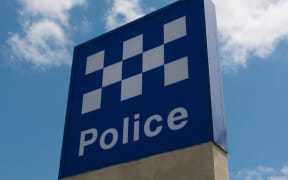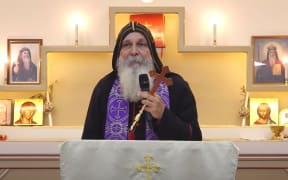Exclusive by ABC Investigations' Sean Rubinsztein-Dunlop
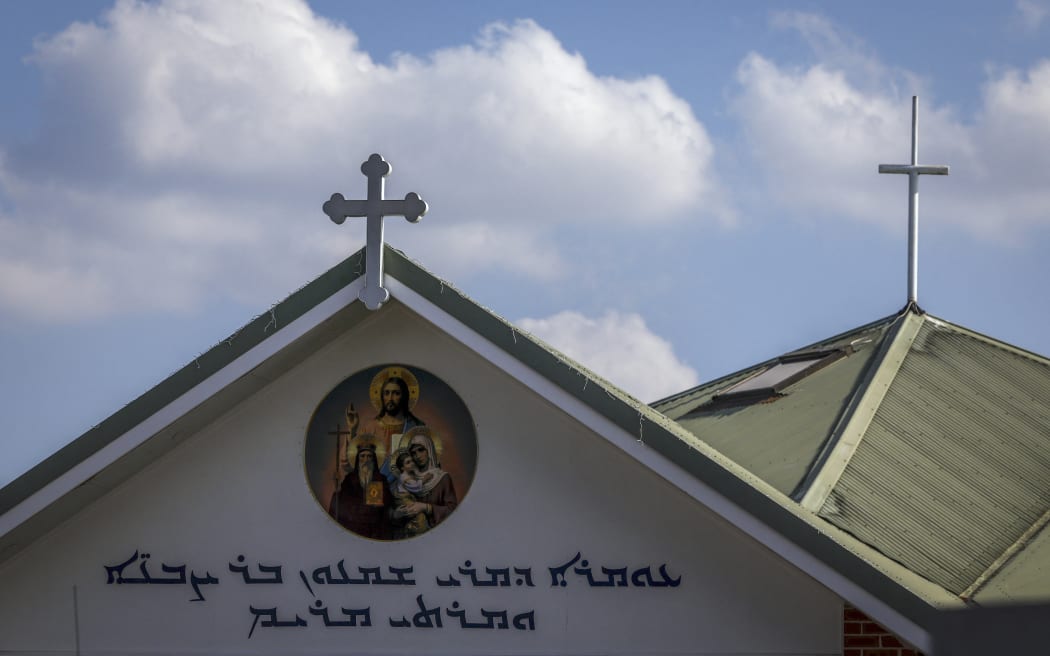
Crosses adorn the roof of the Christ the Good Shepherd Church in Sydney's western suburb of Wakeley on 16 April 2024. Photo: AFP / DAVID GRAY
In the hours before a 16-year-old boy stabbed a bishop in an alleged terrorism attack at a Sydney church, his parents' frantic calls to him went unanswered.
Two days earlier, the boy was in tears over the sudden death of a friend.
But when his father arrived to take him to the wake on the evening of Monday, 15 April, his son had disappeared from their south-west Sydney home, leaving his dad a watch and a bottle of cologne.
Then, his mother received a phone call, asking if her son was home and okay.
"I felt something wasn't right," the boy's mother told ABC Investigations, speaking publicly for the first time since the attack on Bishop Mar Mari Emmanuel during a live streamed service at the Christ the Good Shepherd Church in Wakeley a fortnight ago.
"I said, 'Please tell me what's been happening. Did you hear about anything?' "
Her friend sent her a video that was already going viral, showing the stabbing of the Assyrian Orthodox bishop, whose inflammatory comments about Islam and the Prophet Muhammad had been viewed by millions online.
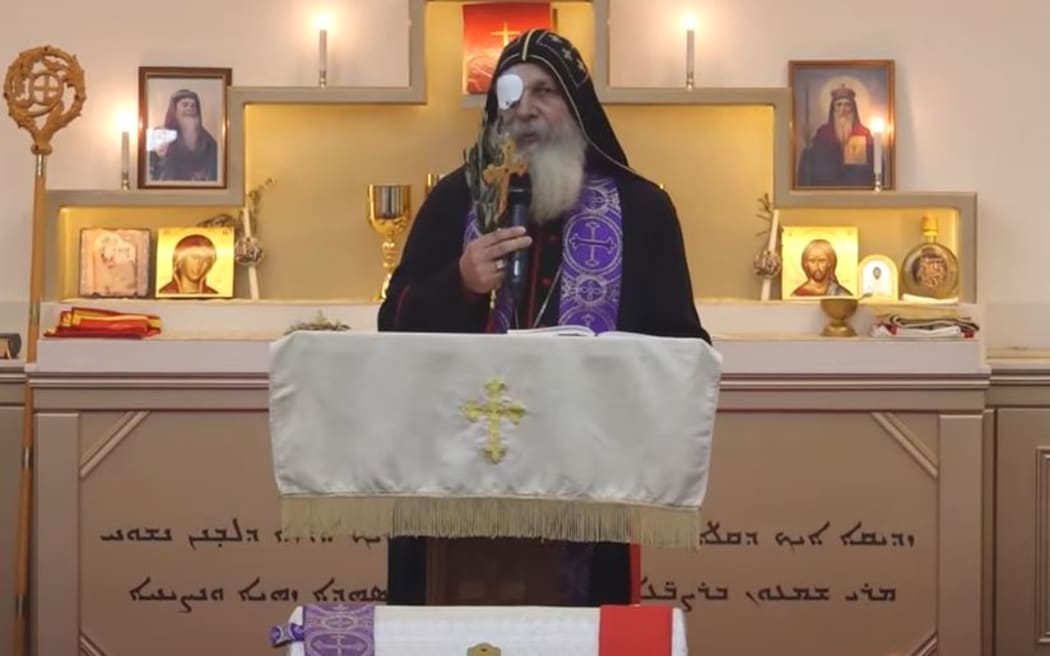
Bishop Mar Mari Emmanuel has returned to the Christ The Good Shepherd Church in Wakeley where he was allegedly attacked on 15 April 2024. Photo: Screenshot / Youtube
The sight of the attacker sent her into shock.
"When I saw him, I threw the phone," she said. "I couldn't move."
In an interview airing on the ABC's 7.30 programme tonight, the boy's parents sobbed as they expressed relief that Bishop Emmanuel survived the stabbing and thanked police for protecting their son in the ensuing riot.
The attack triggered an urgent investigation, leading to mass police raids across Sydney last week and charges against six more boys, as young as 14, accused of being part of a terrorist network with the Wakeley attacker.
An ABC investigation into the 16-year-old has uncovered a history of severe behavioural issues, interactions with extremists online, and police suspicions of links to a former Islamic State member notorious for his influence on young terrorists.
The boy was now in custody and faced a possible life sentence if convicted of committing an act of terrorism, but his parents insisted their son was no terrorist.
Their account of his life painted a picture of a vulnerable and violent child, with serious anger management issues, longstanding mental health concerns and suspected autism spectrum disorder.
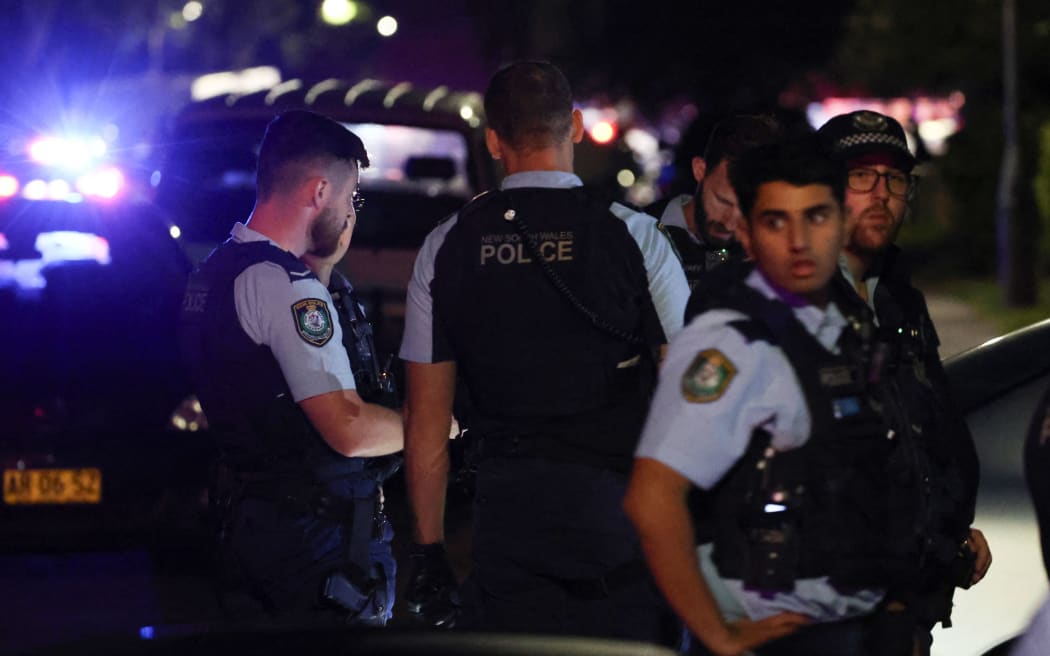
New South Wales police gather outside the Christ the Good Shepherd Church in Sydney's western suburb of Wakeley on 15 April 2024. Photo: AFP / David Gray
'When he gets angry, he becomes dangerous'
He was always a troubled child, according to his parents.
When he was a baby, he started hitting his head with his hands repeatedly.
His family called him "Ballerina" because of his habit of walking on his toes.
By the age of 13, his parents said he was treated by his first psychologist, who recommended a psychiatric assessment for autism spectrum disorder.
The boy struggled to sit still or study at school, where his parents said he was bullied.
But worse still, he could fly into a rage in the classroom. He saw a succession of counsellors for serious violence and behavioural issues starting in primary school.
"In school, I used to get scared whenever I'd get a phone call, because I knew that they complained about him," his mother said in an interview recorded before last week's raids.
"He has the nicest heart, but the problem is, when he gets angry, he becomes dangerous.
"When he's angry, he doesn't know what he's doing."
She said her son was repeatedly suspended.
Last year, his parents pulled him out of high school after he bashed another boy.
It was the second school he had been forced to leave.
Last November, the boy and a friend were arrested at a Sydney train station when police alleged officers found them with a knife.
He was sentenced to a good behaviour bond for intimidation and damaging property, but the knife offence was dropped.
He was violent at home too.
Last year, he hit his mother when she tried to intervene in a fight, forcing her to seek medical treatment for injuries to her ribs.
As always, she said, she forgave her son.
"He didn't mean it. He was hitting his brother," she said.
"I couldn't imagine he could do something like that."
She said she was reminded of his apologies for her injuries when she visited him last week in hospital, where he was being treated for self-inflicted wounds to his hand after the Wakeley stabbing.
"He was asking for a hug and kiss because he saw I was upset," she said of her visit to him after the church attack.
She believed he was not in his right mind.
"Sometimes he'd laugh, sometimes he'd say 'I don't know'," she said.
"He was showing me his hand like a baby.
"I think he didn't know what he was doing."
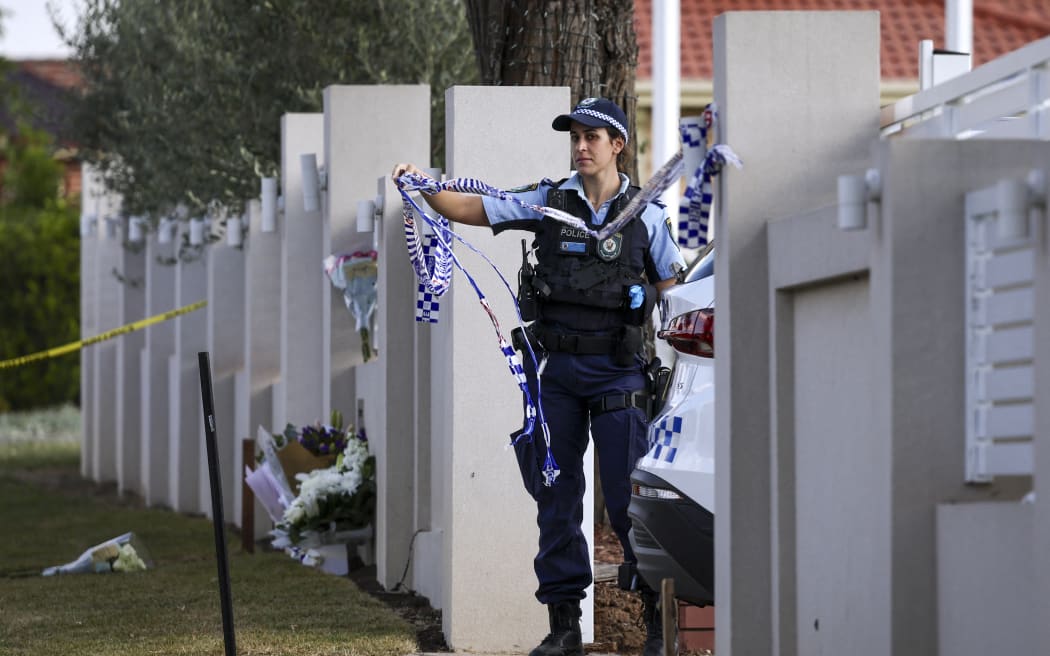
A police officer lifts tape to let a car into the Christ the Good Shepherd Church in Sydney's western suburb of Wakeley on 16 April 2024. Photo: AFP / DAVID GRAY
Boy interacted with extremists accounts online
After the boy left school last year, a second psychologist urged his parents to seek an autism diagnosis.
But by their account, life and death got in the way.
There was an urgent trip to Lebanon to support a dying uncle and the boy's mother was seriously unwell for months.
She said her son was increasingly unruly and defiant.
He refused to go to TAFE (Technical and Further Education) and could not find a job.
At home, he spent long nights in the dark in his room on his phone. His parents insisted they had no idea what he was doing.
ABC Investigations has discovered that in the months leading up to the stabbing, the boy was interacting with extremists in Australia and following extremist accounts online.
He liked a series of violent extremist posts published on Instagram, including a video of Osama bin Laden encouraging followers to die for the cause.
The boy was a fan of sermons on social media by American-based radical preacher Sheikh Ahmad Musa Jibril, who was popular among terrorists in Australia and abroad.
He scolded others in Instagram comments, including a Muslim woman who wore make-up and danced on camera.
On the night of the stabbing at the Wakeley church, the 16-year-old made one final post to Instagram, imploring Muslims to open their eyes to "disbelievers" and "attain victory over their enemies".
His post tagged a UK-based extremist account which encouraged followers to become so-called martyrs.
The boy uploaded the post around 6pm, just over an hour before the live streamed attack.
"It was a very clear message that he had got to the point where he was motivated to act on his beliefs," Peta Lowe said, a juvenile extremism expert and former director of Countering Violent Extremism for NSW Juvenile Justice.
"It's very common for individuals to have what they call 'leakage', just as they approach actually conducting an attack."
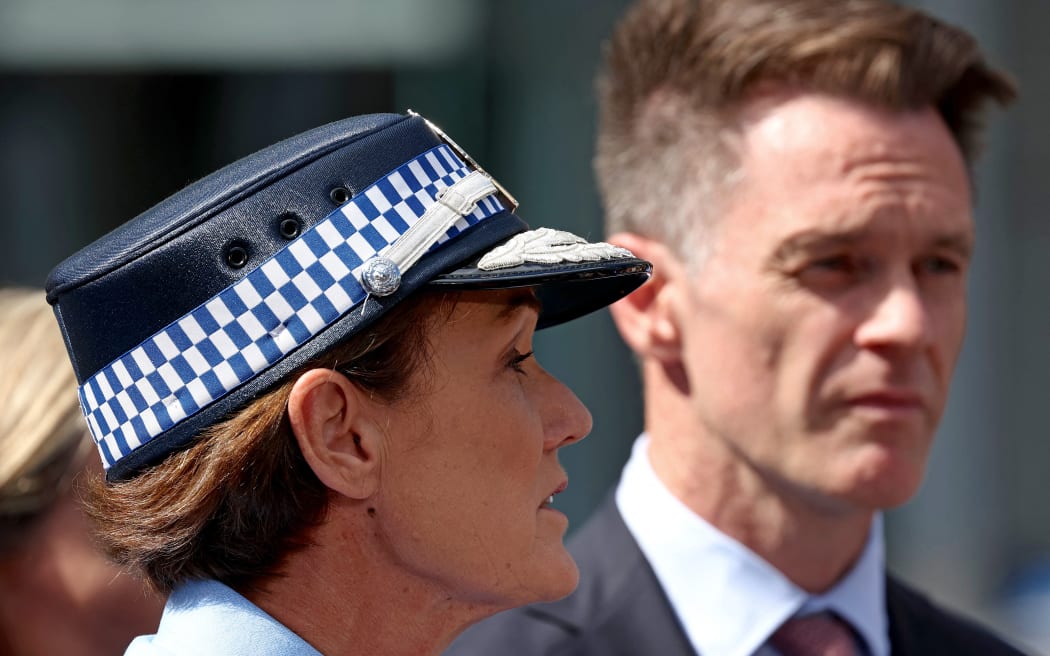
NSW Police Commissioner Karen Webb (front). Photo: AFP / DAVID GRAY
Police allege network poses 'unacceptable risk'
Police were now urgently working to unravel who the boy was communicating with on his phone and in person, in a joint counterterrorism team (JCTT) investigation codenamed Operation Mingary.
Six hours after the attack, NSW Police Commissioner Karen Webb declared it an act of terrorism, triggering the investigation with federal and state counterparts.
Officers seized the boy's phone and discovered he was part of a WhatsApp group, called BROTHERHOOD, with other teenagers who expressed sympathies with violent extremism.
The Wakeley attacker used a smiling portrait of Osama Bin Laden as his WhatsApp profile picture.
On Telegram, he used pictures of Islamic State fighters.
As Operation Mingary put a number of his contacts under surveillance, police alleged they uncovered a terrorism network of boys as young as 14, some of whom were loosely connected but all accused of sharing a violent ideology.
The JCTT decided to pounce within nine days because of "unacceptable risk and threats" to the public.
A senior law enforcement source told the ABC some boys were in the "early stages of preparations" for an attack and were feared to be "highly volatile".
Four boys arrested in last Wednesday's raids were charged with conspiring to prepare for a terrorist act.
Another two, aged 14 and 16, were charged with possessing extremist material, including Islamic State videos of beheadings.
The 14-year-old was already on bail accused of possessing an unauthorised pistol, possessing an unauthorised firearm and charges related to assault and aggravated robbery.
Several had already faced court accused of other offences.
Notorious former Islamic State member questioned
Detectives were trying to establish whether, as in most terrorism cases, the Wakeley attacker and other boys were groomed and recruited.
As revealed by ABC Investigations last week, Operation Mingary was examining the role played by a violent Sydney criminal and former Islamic State member, Wassim Fayad, who was one of two men questioned but not charged in last week's counterterrorism raids.
Fayad, 56, was notorious for his influence upon young terrorists and extremists, even from inside jail.
In 2015, the self-styled preacher and former extremist bookstore owner was alleged by the JCTT to be part of an Islamic State cell codenamed the Appleby Group, whose young members visited him in prison while he served a seven-year sentence.
Several of the young men went on to commit terrorist acts, including assisting the 15-year-old boy who shot dead police accountant Curtis Cheng at the NSW Police headquarters in 2015.
Fayad's connections to younger Sydney extremists were laid bare in 2013 when he was convicted of leading the brutal whipping of a Muslim convert for his use of drugs and alcohol - a punishment justified by his twisted interpretation of Sharia law.
While on bail in 2015, he carried out a failed ATM ram raid - aimed at raising funds for the Syrian cause - and was an accessory to an attempted shooting murder outside a gay sex club.
After his release from jail, the Supreme Court placed Fayad on a two-year extended supervision order in 2021, ruling he was a high risk of recruiting young and vulnerable people to commit terrorism offences.
But a judge refused to extend the order last year, finding the state of NSW had not proven Fayad remained part of an extremist network with the capacity to commit acts of terrorism.
He claimed to no longer support Islamic State and refused to participate in a psychiatric risk assessment prepared for the judge.
Police were now examining electronic material seized from Fayad's home for evidence of any role in the alleged terrorist network or the stabbing at the Christ the Good Shepherd Church.
"There are usually some older, more charismatic type leaders who will gather younger people and influence them," deradicalisation expert Peta Lowe said.
"Younger people are really valuable to extremist groups or organised crime gangs because they don't have the same level of consequential thinking.
"They become very vulnerable because they're still forming an identity."
The Wakeley attacker's parents told the ABC they had not noticed the 16-year-old had any concerning associations or extremist views.
They said he practiced his faith like a normal Muslim child, praying five times a day and fasting for Ramadan.
And he played drums, listened to music and danced - practices forbidden by the fundamentalist interpretations of Islam that have been co-opted by violent extremist groups.
Distress and dismay in the Muslim community
The police response to the Wakeley attack had sparked deep distress and anger in south-west Sydney's tight-knit Muslim community.
Community leaders have expressed dismay at language used by police and ASIO about "religiously-motivated" extremism, which they said conflated Sunni Islam with terrorism.
Jamal Rifi, a community leader and retired GP who was supporting the family of the Wakeley attacker, said police also failed to take mental health issues into account.
"In the community, if you are a Muslim, then you are definitely a terrorist, but if you're not a Muslim, they will look for psychological issues," said Dr Rifi, who has worked closely with police to counter violent extremism.
Rifi pointed to the NSW Police decision to declare the Wakeley stabbing an act of terrorism just six hours after the attack, while the 16-year-old was scheduled in hospital for an assessment of possible mania.
According to court documents, the assessment cleared the boy of a mental health disorder by the following day, but his family said he now needed a full psychiatric evaluation.
"What he did is totally inexcusable," Rifi said.
"We are not looking for him to be exonerated, we just want him to have a fair go the same as any other young person with an undiagnosed mental illness.
"This is a potential life sentence."
NSW Police said the Wakeley stabbing fell within the legal definition of a terrorist act and it did not target anyone based on religion or ethnicity.
Lowe said a nuanced debate was needed in Australia about how to manage radicalised young people and those at risk.
"A lot of people who are perpetrators in a terrorism context are also victims," she said.
"In this case, he is a victim of the information [he has consumed], the grooming that's no doubt occurred online, but also potentially he is a perpetrator.
"That doesn't mean that we can't understand the reasons why he ended up engaging in that attack and what then can be done for him.
"And for other young people, to make sure that we address those kinds of things that make them vulnerable."
Those questions keep the teenager's parents up at night, as they ask how a boy they raised could stab a religious leader.
"If he's truly religious, like we raised him, he wouldn't have done that," his mother said.
"He's made a big mistake, a very big mistake.
"But I believe he wasn't in his right mind."
- ABC

